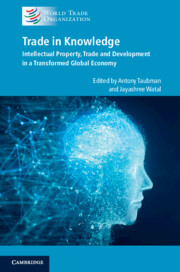Book contents
- Frontmatter
- Contents
- Figures
- Tables
- Contributors
- Preface
- 1 Thematic Overview: Charting the Evolution of Knowledge Flows
- Part I Conceptual Framework
- Part II Measuring Trade in Knowledge
- Part III Impact of Knowledge Flows on Trade and Development
- Part IV Policy, Regulatory and Legislative Frameworks
- Part V Looking Forward
- Index
7 - Global Ebbs and Flows of Patent Knowledge
from Part II - Measuring Trade in Knowledge
Published online by Cambridge University Press: 17 February 2022
- Frontmatter
- Contents
- Figures
- Tables
- Contributors
- Preface
- 1 Thematic Overview: Charting the Evolution of Knowledge Flows
- Part I Conceptual Framework
- Part II Measuring Trade in Knowledge
- Part III Impact of Knowledge Flows on Trade and Development
- Part IV Policy, Regulatory and Legislative Frameworks
- Part V Looking Forward
- Index
Summary
We use patent citation data to map the flows of technical knowledge, and in particular to test three hypotheses. First, that the net flow of technical knowledge tends to be from more developed to less developed countries. Second, that the trajectory of climate change-mitigation knowledge flow increased (especially from developed to developing countries) after the 1997 Kyoto Protocol and the 2015 Paris Agreement on climate change. Third, that the trajectory of pharmaceutical knowledge flow increased after the conclusion of the TRIPS Agreement. We find that massive amounts of technical information are exchanged, among countries around the world, in sometimes surprising patterns. Developed country patents supply a disproportionate amount of patent citations compared to patents from developing countries, and the importance of technical knowledge thereby transferred is disproportionately high. However, we observe some evidence that this imbalance in knowledge flow may be beginning to reverse itself, as developing country patents have become increasingly cited by those in developed countries, and the importance of developing world patents has grown. We did not discern evidence that the Kyoto Protocol has spurred knowledge flow in climate-mitigation technology, but found some preliminary evidence consistent with an effect by the Paris Agreement. We did find evidence consistent with the possibility that the TRIPS Agreement may have spurred pharmaceutical (and more general) knowledge flow.
- Type
- Chapter
- Information
- Trade in KnowledgeIntellectual Property, Trade and Development in a Transformed Global Economy, pp. 218 - 264Publisher: Cambridge University PressPrint publication year: 2022

